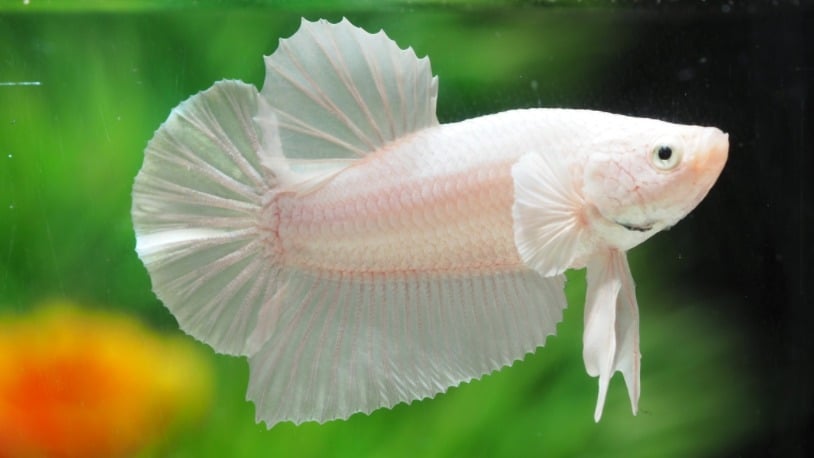The betta fish is a freshwater fish that originates from the oceans of Southeast Asia. These colorful creatures are popular for their unique appearance and feisty personality, which is why they’re so popular as pets.
However, if your betta starts losing color or showing signs of distress it might be time to take action! In this article, we will discuss what to do when your betta fish loses its color and why this could happen in the first place…
Why Is My Betta Fish Losing Color?
Your betta fish is losing color because it is stressed, of old age, illness or injury. Finding the specific cause for the loss of color is important in order to take the appropriate course of action.
For example, a betta fish that is losing its color because it’s stressed will need to be removed from the source of stress in order for any change in coloration to occur. On the other hand, a betta fish that has lost its color due to old age or illness may not recover.
I will now talk about each potential cause and what you can do to remedy the situation.
1. Stressed
If your betta is stressed, it might lose its color as a result. One common cause of stress in bettas is a change in their environment, such as being moved to a new tank or having different water conditions than they’re used to.
You can reduce your betta’s stress levels by providing a calm, peaceful environment for them to live in. This means keeping them in a tank that minimizes water currents and having an ideal temperature for the fish.
Also, be mindful of how many fish you have in the same tank. Betta is territorial fish and can become stressed if they’re constantly competing for space and food.
If you suspect stress might be causing your betta to lose its color, make sure their environment is as comfortable as possible before trying any other remedies…
2. Old Age
As betta fish get older, they might lose their color as a result of declining health. If your betta is losing its color and you think it might be due to old age, there isn’t much you can do except make sure it’s being cared for adequately.
Betta fish usually live for around four years, but there are some cases in which they’ve lived up to five. If your betta is at least three years old then it’s likely due to old age that makes them lose their color.
3. Illness
This is another common reason for a betta fish to lose its color. If your betta appears lethargic, isn’t eating, and is losing weight, it might be sick.
Any changes in your betta’s appearance or behavior should be monitored closely, as they can indicate that something is wrong. Take your betta to a vet immediately if you think it might be ill.
4. Injury
If your betta has been injured, it might lose its color as a result. This can happen if your betta is attacked by another fish or if it falls out of its tank. An injured betta fish that is losing its color may be suffering from a lack of oxygen due to the injury. If you think your betta might have been injured, take it to a vet as soon as possible.
How Can I Restore My Betta Fish Color?
It will depend on the specific cause of the loss of color in your betta fish. If the cause is stress, you can usually restore their color by removing them from the stressful environment.
If old age is the culprit, there isn’t much you can do except make sure they’re comfortable and well-cared for. If the illness is to blame, your betta might need medication or treatment to get better.
In any case, it’s important to seek professional help if you’re not sure how to restore your betta fish color. The vet will be able to give you specific instructions on how to care for your betta fish.
How to Make My Betta More Colorful?
There are a few things you can do to make your betta more colorful. Here are the most common methods:
Improve the Environment
One way to make your betta more colorful is to improve the water quality in their tank. This means keeping the water clean and well-oxygenated. You can do this by changing the water regularly and using an air pump or filter to increase oxygen levels.
Provide a large tank
Bettas really thrive when they have space, so it’s important not keep them in tiny containers. A large tank will give them plenty of room to swim and explore. The more space they have, the more happy and colorful they’ll be.
Provid a filter and heater
If you keep your betta fish in a tank without a filter or heater, their water conditions will be poor and they’ll be more prone to losing color. A good filtration system keeps the water clean through biological filtration, while an appropriate heater maintains ideal temperature levels for swimming.
Change water often to keep it fresh
Another way to keep your betta’s water clean and healthy is to change it often. This means removing all the old water and replacing it with fresh, new water. This can be done once every few weeks, depending on how often you think it’s necessary.
Feed them the Best Food
There are foods that will enhance their color and make them more vibrant. And then there are foods that will just lower the quality of your betta’s life. Some brands you should never buy at all! Here’s what I recommend feeding your betta to improve its color.
Salmon
The best fish you can feed your betta is salmon. It contains a lot of great nutrients and it’s also full of color enhancers. And the good news is that they’ll love it. This is because it contains lots of omega-three fatty acids that are very good for them!
Be careful with it though, because too much can lead to constipation. I recommend only giving small pieces of salmon a few times per week.
Daphnia
Daphnia is a creature that’s also rich in color enhancers and it has a similar omega-three fatty acid content. And the best part is, betta fish love them!
You can feed your betta these by crushing them up and putting them into their water. However, if you decide to do this be careful because they might start eating too many and get sick. I recommend only feeding them a few every other day.
Use High-Quality Food
And finally, make sure you’re using high-quality fish food. Don’t buy the cheap stuff! It might cost a few extra bucks but it will be worth it in the long run because your betta will get sick if they eat that kind of food on a regular basis.
Don’t Overstock Your Tank
Stocking your tank with too many fish can also lead to a loss of color in your betta. This is because the more fish you have, the more competition they’re going to have for food and space.
How Long Does It Take for Bettas to Regain Color?
If the stress is removed from your betta fish, it shouldn’t take too long for them to regain their color. However, if there’s a disease that is causing this problem then treatment will be required and recovery time can vary based on severity. The average person should expect at least a few weeks before seeing any real difference in their bettas’ condition.

Why Is My Betta Turning White?
This is a question I’m often asked, and the answer isn’t always easy to determine. There are many different things that can cause a betta fish to turn white, including stress, disease, poor water quality, and malnutrition. Here are the most common causes:
Columnaris
Columnaris is a bacterial infection that can cause your betta to develop white spots. It’s often seen in fish that are kept in dirty water or in tanks with too many fish.
If you think your betta might have Columnaris, it’s important to get them treated right away. The bacteria that cause this infection can be very harmful and can often lead to death.
Anchor Worms
Another common cause of white betta fish is Anchor Worms. This parasite lives on your betta’s body and it can be extremely harmful if left untreated. They attach themselves to the fins or gills, which will make them difficult for your betta to swim around with ease.
If you catch these parasites before they get too bad, they can often be treated with simple medication. However, if they’re left untreated for too long they can cause serious damage and even death.
Ich
Ich is a very common and deadly disease that can also make your betta lose their color. It’s caused by tiny parasites called ichthyophthirius multifiliis, or Ich for short. The white coloring is in the form of white spots and it’s most often seen on the fins and tail.
Stress
As we mentioned previously, stress can also be a common cause of color loss in betta fish. This is because when they’re stressed they stop eating and their coloring starts to fade.
So keep your betta happy by providing them with a stress-free environment. This can include plenty of plants, hiding spots, and subdued lighting.
Fin Rot
Fin Rot is a fungal infection that can cause your betta’s fins to turn white. It starts as small spots on the edges of their fins and it slowly spreads from there, eventually leading to tissue decay if left untreated.
The best way to treat this disease is by keeping good water quality in your tank and treating it with medication when necessary.
Conclusion
To conclude, there are plenty of possible reasons why a betta fish might be losing their color, and knowing which one applies to your specific situation can help you decide how best to restore it. In most cases, this is done by making the fish more comfortable in its environment, but if that doesn’t work then professional help may be needed.






